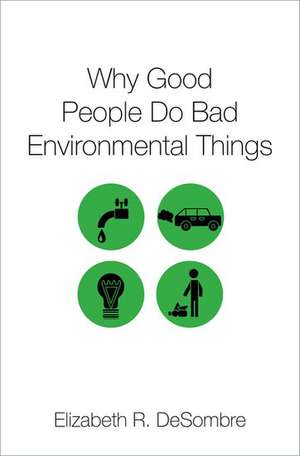Why Good People Do Bad Environmental Things
Autor Elizabeth R. DeSombreen Limba Engleză Paperback – 17 sep 2020
| Toate formatele și edițiile | Preț | Express |
|---|---|---|
| Paperback (1) | 173.44 lei 32-37 zile | |
| Oxford University Press – 17 sep 2020 | 173.44 lei 32-37 zile | |
| Hardback (1) | 251.65 lei 32-37 zile | |
| Oxford University Press – 28 iun 2018 | 251.65 lei 32-37 zile |
Preț: 173.44 lei
Preț vechi: 188.76 lei
-8% Nou
Puncte Express: 260
Preț estimativ în valută:
33.19€ • 36.16$ • 27.97£
33.19€ • 36.16$ • 27.97£
Carte tipărită la comandă
Livrare economică 14-19 aprilie
Preluare comenzi: 021 569.72.76
Specificații
ISBN-13: 9780197523803
ISBN-10: 0197523803
Pagini: 266
Dimensiuni: 150 x 231 x 15 mm
Greutate: 0.4 kg
Editura: Oxford University Press
Colecția OUP USA
Locul publicării:New York, United States
ISBN-10: 0197523803
Pagini: 266
Dimensiuni: 150 x 231 x 15 mm
Greutate: 0.4 kg
Editura: Oxford University Press
Colecția OUP USA
Locul publicării:New York, United States
Recenzii
Those clamoring for environmental change will learn much from DeSombre's excellent work. She makes basic research in social psychology and other fields accessible as she explains why good people do bad environmental things, and shows what can be done about it."
Beth DeSombre, again, has written an utterly elegant treatment of a complex matter. This book asks the question that all students of environmental affairs must confront and which have immediately obvious, but usually wrong or incomplete, answers. In some of the clearest language you will find in the field, the book lays out the reasons why it is important that we know enough or care enough about the environment, but that these elements are not enough to understand why bad things still happen to the environment. This book is well suited for virtually any class on environmental issues where the question in the title is of interest."
This wonderful book reveals how our daily environmental practices are shaped by deeper social forces and why this matters for the future of the environmental movement. Effortlessly moving across academic disciplines, DeSombre provides a fascinating account of the political dimensions of sustainability."
This volume combines psychological, economic, and environmental approaches to offer a unique perspective on environmental policy. Addressing the widespread polarization over global climate change, DeSombre (Wellesley College) argues that nobody intends bad environmental effects...these and other themes are explored in a tightly organized book featuring factors such as social structures, extrinsic versus intrinsic factors, positive incentivization (e.g., subsidy), negative incentivization (e.g., regulation), attitudes, and scientific knowledge. Documented with 30 pages of notes and 26 pages of references, the book is an excellent resource for readers concerned about environmental policy." -CHOICE, F. T. Manheim, George Mason University
Beth DeSombre, again, has written an utterly elegant treatment of a complex matter. This book asks the question that all students of environmental affairs must confront and which have immediately obvious, but usually wrong or incomplete, answers. In some of the clearest language you will find in the field, the book lays out the reasons why it is important that we know enough or care enough about the environment, but that these elements are not enough to understand why bad things still happen to the environment. This book is well suited for virtually any class on environmental issues where the question in the title is of interest."
This wonderful book reveals how our daily environmental practices are shaped by deeper social forces and why this matters for the future of the environmental movement. Effortlessly moving across academic disciplines, DeSombre provides a fascinating account of the political dimensions of sustainability."
This volume combines psychological, economic, and environmental approaches to offer a unique perspective on environmental policy. Addressing the widespread polarization over global climate change, DeSombre (Wellesley College) argues that nobody intends bad environmental effects...these and other themes are explored in a tightly organized book featuring factors such as social structures, extrinsic versus intrinsic factors, positive incentivization (e.g., subsidy), negative incentivization (e.g., regulation), attitudes, and scientific knowledge. Documented with 30 pages of notes and 26 pages of references, the book is an excellent resource for readers concerned about environmental policy." -CHOICE, F. T. Manheim, George Mason University
Notă biografică
Elizabeth R. DeSombre is the Camilla Chandler Frost Professor of Environmental Studies at Wellesley College, where she directs the Environmental Studies Program. Her background is in international environmental law (with a particular focus on oceans) and United States environmental policy. She has written seven books and won two book prizes. She is also a touring folk singer-songwriter and has recorded four CDs.
